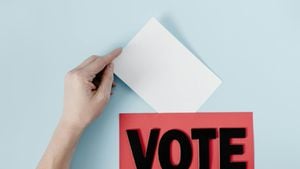Recent actions by universities across North America, particularly following the resurgence of violence and conflict between Israel and Palestine, have sparked heated debates on campuses. Institutions like McGill, the University of Edinburgh, and UCLA find themselves at the center of controversies fueled by student activism and global unrest.
At McGill University, students initially set up camp to protest what they described as the genocidal war against Gaza. Although the protest camp was dismantled by university authorities, the protests revealed significant financial ties between McGill and companies implicated with the Israeli military, prompting calls for divestment.
The camp's eviction by McGill was justified by the administration as necessary for health and safety reasons. But for many students, it represented the university's unwillingness to confront its implicated financial roles.
Efforts to push back against the ties were organized by groups like Solidarity for Palestinian Human Rights (SPHR). One student, known as Ward, articulated feelings of betrayal, emphasizing how tuition funds seemingly support oppressive practices.
Despite the dismantling of the protest, students renewed their demands, seeking complete disinvestment from companies involved with military actions against Palestinians. Data revealed McGill had invested over $73 million in companies linked to military operations against Gaza, igniting outrage from the student body.
Of significant concern was the university’s investment in Lockheed Martin and other defense contractors. Such findings led students to accuse their institution of facilitating actions contributing to loss of life and human rights violations.
Concordia University, another prominent educational institution, also faced scrutiny over its financial decisions. Although university officials claimed to have divested from some arms-related investments, student groups challenged the accuracy of these statements, demanding transparency.
At the University of Edinburgh, tensions have flared due to management meetings with Israeli officials. An open letter signed by over 500 staff members called for the university's divestment from companies supporting the Israeli government, emphasizing accountability amid rising scrutiny from faculty and students alike.
Concerns grew following the principal’s engagement with the deputy ambassador from Israel, raising alarms about potential complicity with human rights violations. Critics accused university leaders of ignoring deteriorative conditions faced by Palestinians amid the conflict.
Responses from the university indicated resistance to claims of complicity, with administrators asserting investment decisions are managed under broader strategies. Nonetheless, this position has not quelled the growing calls from both students and faculty for greater accountability and ethical investment practices.
Meanwhile, UCLA has been designated as an institution of concern by the Council on American-Islamic Relations (CAIR) and the American-Arab Anti-Discrimination Committee (ADC). The designation was attributed to reported hostile academic environments for those opposing violence against Palestinians and highlighted concerning patterns of racial and ethnic antagonism.
With police actions against student protestors at UCLA leading to violence, students highlighted how administrative responses often stood against their advocacy for Palestinian rights. The violent confrontations have become emblematic of broader issues present at multiple universities.
Emory University also faced challenges, where Palestinian students reported racial harassment and violence under the guise of maintaining campus safety. Investigations by civil rights offices followed, shining light on systemic issues affecting students amid national unrest.
The involvement of nationwide organizations like CAIR points to the broader societal issues tying educational institutions to global political struggles. With academia becoming increasingly intertwined with global justice movements, the necessity for transparency and ethical practices remains critical.
Faculty members like Nicola Perugini at the University of Edinburgh criticized the institution for legitimizing state violence through diplomatic relations. Such dialogues, they argue, reinforce complicity rather than promote constructive conversation about conflict resolution.
Teachers and activists alike stressed the importance of ethical standards and the moral responsibilities educational institutions carry. The outcry from campuses serves as not only communal lament but also as calls for systemic change within higher education environments.
Educational leadership faces mounting pressure as activists continue to risk their educational standing to spur institutional change and support for Palestine. This rising call aligns with global movements advocating for equitable policies and the cessation of human rights violations.
Student protests across various campuses clearly demonstrate the transitional nature of campus political culture. With educators witnessing the urgency of student calls, the quest for accountability and ethical investment continues to transform how universities operate and interact with global political issues.
Universities are often seen as bastions for free thought, but recent events expose cracks in this ideal, drawing questions about the very values these institutions uphold. This dichotomy presents significant challenges for academic leaders as they navigate institutional commitments alongside calls for social justice.
While campuses remain focal points for advocacy and discourse, the outcomes of these protests reflect broader social dynamics. Students are reshaping the dialogue around complex issues, including institutional responsibility and global human rights advocacy.
Moving forward, the pressure mounts as university leaders express attempts at flexibility but struggle with entrenched systems. The way institutions respond to these emerging pressures could redefine educational values and ethical commitments across North America.
The continuing socio-political climate will likely sustain these tensions, as students persistently call for justice and accountability. With every protest, the imperative for universities to act ethically and transparently gains more traction, potentially reshaping the narratives surrounding education and activism.
Current and future generations of students will likely continue to challenge institutional complacency and demand ethical practices aligned with human rights. How universities adapt and respond to these challenges will significantly shape their legacy and influence.
A decisive action—or lack thereof—could forever change institutional relationships with social justice movements. This pivotal moment poses critical questions: How far will universities go to uphold their commitments to freedom, values, and rights? Whether they choose to ignore or embrace these challenges will define their role during turbulent global times.
The decisions made during these times will determine the effectiveness of institutions as they aim to navigate activist narratives and advocacy efforts within their walls. The balance between maintaining institutional integrity and responding to urgent calls for justice will shape the future of higher education.
With intensifying scrutiny surrounding their practices and values, these universities must decide where their priorities lie. Will they continue down paths contradictory to the values they preach, or will they embrace the chance to become advocates for justice and equity?



